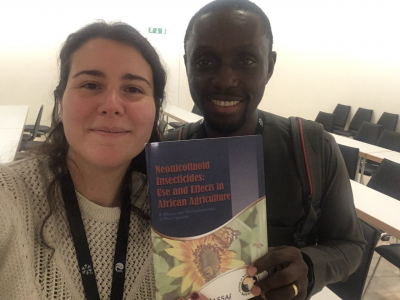


‘Neonicotinoids and their impact on ecosystem services for agriculture and biodiversity in Africa’, a report by the InterAcademy Partnership (IAP) and the Network of African Science Academies (NASAC), was the subject of a session at the World Biodiversity Forum that took place in Davos, Switzerland, from 23 to 28 February 2020.
Enock Dankyi, a representative of the Ghana Academy of Arts and Sciences and an expert on environmental pollutants who work on the report, joined the wvent to present this study.
The session examined the evidence for the impact of neonicotinoids in Africa and presented the eight recommendations for policymakers that can be used to protect ecosystem services and thus contribute to food and nutrition security in Africa.
“Around 60 people attended the session. Several participants had heard about neonicotinoids but have not considered it much or were not directly working on anything related,” says Dr. Dankyi.
Still, he adds, there was a clear interest in the use of neonicotinoids in African case, even if in the audience there were few African participants.
“This because the presentation offered a holistic of African biodiversity,” Dr. Dankyi says.
Since their introduction onto the market in the 1990s, neonicotinoids have become the most commonly used insecticides worldwide. Their systemic mode of action renders plant tissue toxic to pests, but also means that the active ingredient gets into pollen and nectar so that non-target species such as pollinators are exposed. In addition, their water-solubility also allows neonicotinoid insecticides to enter the soil and aquatic systems, thus broadening exposure to non-target species.
In Europe, in a report commissioned by the European Commission, the European Food Safety Authority (EFSA) identified potential risks of harm to honey bees, leading to partial restrictions on three main active agents in 2013. To reflect on remaining uncertainties over the extent and nature of neonicotinoid effects in the field, the European Academies Science Advisory Council (EASAC) launched a review of the evidence on the effects of neonicotinoids on ecosystem services of importance to agriculture (pollination, natural pest control and nutrient recycling). The 2015 EASAC report added to concerns about other ecosystem services provided by beneficial insects. Critically, the report also influenced the terms of reference for the scientific update carried out by EFSA, which looked at the effects not only on honey bees, but also on bumblebees and solitary bees. This update, published in 2017, resulted in the EU further restricting the use of the three most commonly used neonicotinoids by limiting them to contained facilities.
In the light of these scientific reviews and regulatory actions, the InterAcademy Partnership (IAP) decided to expand work on the impact of neonicotinoids on ecosystem services and biodiversity to Africa, where agriculture represents the main source of livelihood for most of the population, but data on effects on insect populations is scarce. Funded by the German Federal Ministry of Education and Research (BMBF) and working through members of the Network of African Science Academies (NASAC), two workshops were held in Pretoria, South Africa (November 2018), and in Nairobi, Kenya (May 2019).
Taken together, authors of the EASAC study were joined by experts from 19 African countries. Workshop participants supplemented the scientific evidence that has emerged from Europe and North America with knowledge of the extent of the use of neonicotinoids in African agriculture, and collated evidence on impacts. A final document summarising the workshop discussions, supplemented by a review of the published literature, includes eight of ‘Key messages’ for policymakers that have been endorsed by workshop participants.
The IAP-NASAC report, ‘Neonicotinoids and their impact on ecosystem services for agriculture and biodiversity in Africa’ was published in November 2019 and is available for free on IAP website.